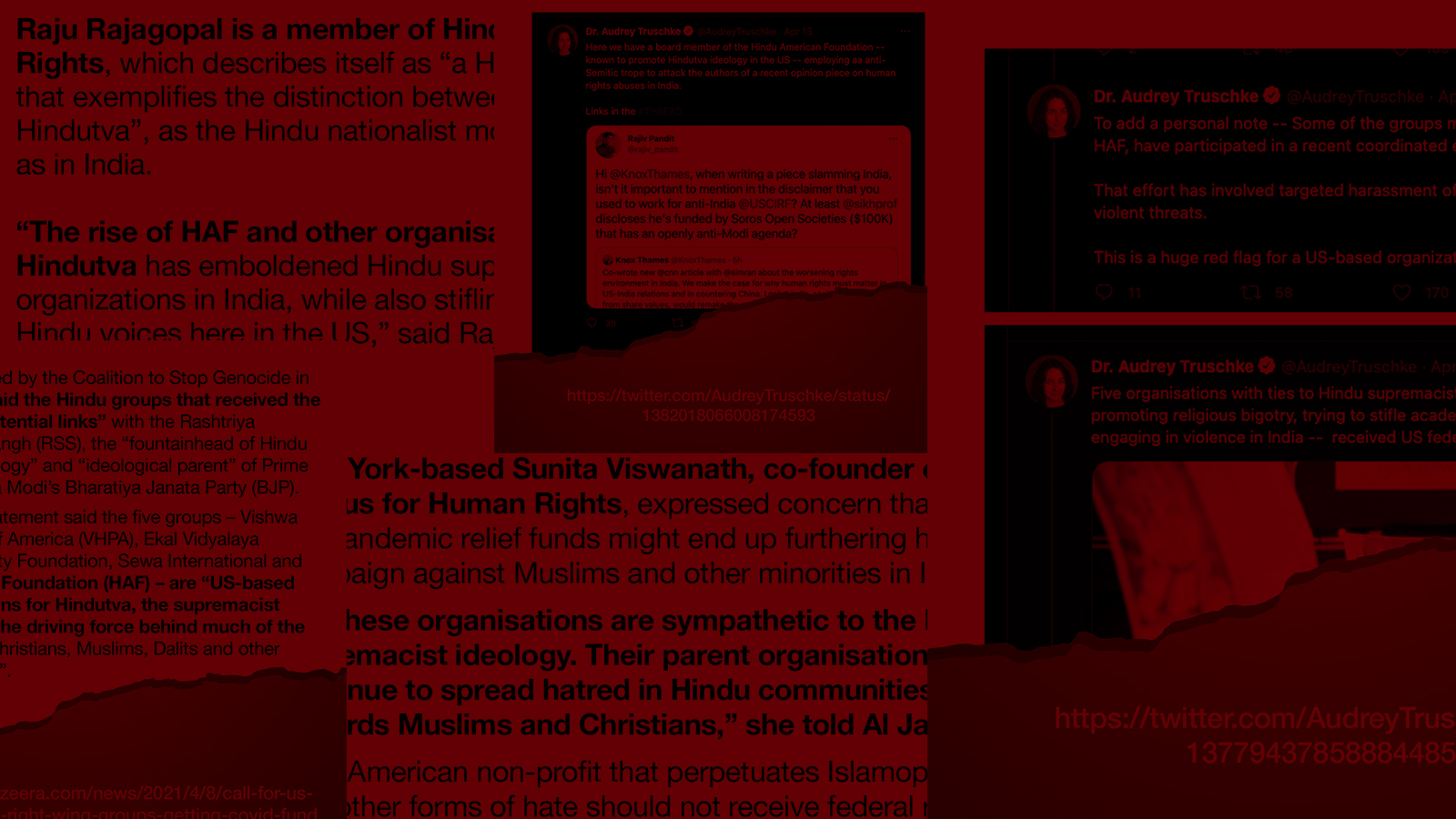On December 20th, 2022, the US District Court for the District of Columbia found that the Hindu American Foundation (HAF) did suffer damages due to “plausibly verifiably false statements” made by some of the defendants in HAF’s lawsuit against Hindus for Human Rights co-founders Sunita Vishwanath and Raja Rajagopal, Indian American Muslim Council executive director Rasheed Ahmed, Federation of Indian American Christian Organizations of North America chairman John Prabhudoss, and Rutgers University professor Audrey Truschke.
Nevertheless, HAF’s lawsuit for defamation and conspiracy to defame was dismissed on procedural grounds, with the court noting the “daunting” standard under the law to make a claim for defamation in the United States.
HAF sued for defamation after the defendants made patently false claims to Al Jazeera that HAF misappropriated COVID-19 related Paycheck Protection Program relief funds to support violence and “slow genocide” against Christians and Muslims in India, and that HAF has “parent organisations” that continue to spread hatred in Hindu communities toward Muslims and Christians.
In its ruling, Judge Amit Mehta found that in fact HAF did incur civil injury (“tortious damage”) caused by the defendants.
Specifically, the court found that Viswanath’s claim that HAF has “parent organizations” in India is “verifiably false.”
The court also noted that “some of Truschke’s statements are arguably verifiably false.”
Still, Judge Mehta dismissed HAF’s complaint on procedural grounds for lack of personal jurisdiction, ruling that most of the defendants were not closely tied enough to Washington, DC, even though false statements were made to Washington DC-based Al Jazeera.
The Court also ruled that as HAF is a “public figure” the bar for proving “actual malice” is very high; and though HAF presented evidence that the organization did not, in fact, send money to support extremist activity in India, the court ruled that some of the defendants’ statements were “opinion” and “rhetorical hyperbole” and did not meet the “high bar” for defamation.
Reacting to the decision, HAF Executive Director Suhag Shukla stated:
“It is incredibly disappointing that though Vishwanath and Truschke among others were found to have made verifiably false statements attacking HAF, the judge dismissed our legal action on procedural grounds. We continue to believe that the defendants’ false and malicious statements about HAF constitute actionable defamation and have every reason to believe that they will continue to spread their malicious lies.”
HAF leaders emphasized that this ruling would not deter HAF’s commitment to serve the education and advocacy needs of Hindu Americans and pursue justice.
HAF Managing Director Samir Kalra remarked:
“We know, as the court found, that Hindus for Human Rights, IAMC, FIACONA and Truschke lie about HAF, and we believe, they often conspire against many Hindu American individuals and organizations in this country. We will be relentless in calling out their malign attacks and we will never hesitate in defending our reputation against hateful lies.”
Though HAF’s Shukla and Kalra said they were deeply disappointed by the ruling, they expressed their appreciation for community support they received.
“Though HAF is disappointed the case will not move forward, it respects the court’s opinion, and feels vindicated where the court found false statements about HAF were likely made. HAF will remain ever vigilant in ensuring the truth prevails, Satyameva Jayate,” Shukla added. ”We are forever grateful and humbled by the unwavering support we received from the community in our defense, and reinvigorated to work even harder for the Hindu Americans and for the protection of Dharma.”
Background on what led to this legal action
In early April 2021, defendants Vishwanath, Rajagopal, Ahmed, and Prabhudoss were all quoted in two Al Jazeera articles presenting patently false claims that HAF misappropriated COVID-19 related Paycheck Protection Program relief funds to support violence and “slow genocide” against Christians and Muslims in India.
HAF’s complaint outlined how the defendants used the US-based Coalition to Stop Genocide in India to provide cover to make further defamatory statements against HAF and demand the US government start an investigation into HAF and other Hindu organizations for allegedly using Federal funds to “sponsor hate” in India.
Professor Truschke, who has worked closely on a number of occasions with IAMC, HfHR, and Sadhana — all organizations controlled or operated by the other defendants — went on the republish and amplify the defamatory statements, while falsely accusing HAF of organizing violent threats against her.
Truschke and IAMC’s advocacy director are both listed as board members of another Coalition to Stop Genocide in India member organization.
Listed as a non-party to the lawsuit but as a co-conspirator to defame HAF was the author of one of the Al Jazeera articles, Raqib Hameed Naik.
HAF’s complaint shows that Naik, rather than simply being an independent journalist, as presented by Al Jazeera, has deep and ongoing connections with both IAMC and HfHR, speaking at events jointly organized by both organizations and serving on IAMC’s executive team.
Following publication of both defamatory articles Naik was listed as a speaker for “News and Media Outreach” at an IAMC quarterly planning meeting discussing advocacy and media strategy.






































